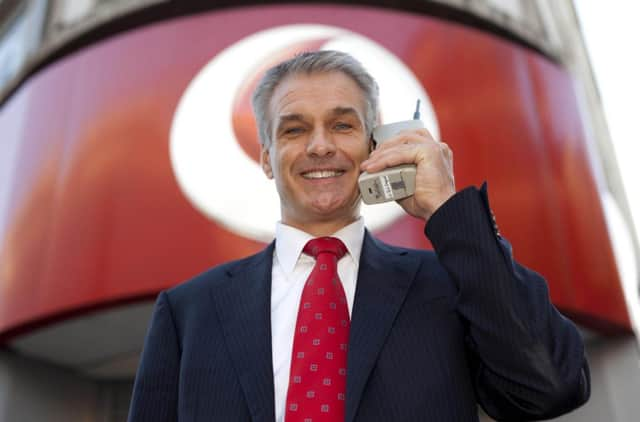Lori Anderson: Mobile phones have got our number


Disclaimer: my mobile phone bill each month amounts to about £3.50. I have never fully embraced the technology, as anyone who knows me will testify. I rarely make mobile phone calls or answer texts, so please don’t bother sending them – they annoy me, I find them infantile and curl my lip when I read a truncated digi-word. I decided long ago that my fingers would not lower themselves to participate in the annihilation of the English language and the eradication of de-limiters. And FaceTime? Well, once you’re over 40 years of age, that’s really only for couples isn’t it? Who in their right mind wants to take an early morning FaceTime call?
But e-mail … oh, I do love e-mail. It’s a fast type, message over, no humming and hawing stream of consciousness.
Advertisement
Hide AdAdvertisement
Hide AdThese new forms of communication started 30 years ago this week when Michael Harrison, a 24-year-old trainee accountant, slipped out of his family’s New Year’s Eve party in Surrey and drove to Parliament Square in London where, a few minutes after midnight he called his father from a Transportable Vodafone VT1 which weighted 5kg and cost the equivalent of £4,500. The first mobile phone call in Britain consisted of Michael telling his father, Sir Ernest Harrison, the chairman of Vodafone: “Hi Dad, Mike here. I’m talking to you from Parliament Square, the very first call from a mobile phone. Happy New Year.”
Back at the family home, Sir Ernest told everyone that this was “a massive moment”, but quite how massive no-one could have known. In 1985, Vodafone was delighted to sell 12,000 mobile phones, each of which took 12 hours to charge enough to support a 30-minute phone call. The first customers were stockbrokers enticed by Saatchi & Saatchi’s advert of a Ferrari-driving wheeler-dealer with the tagline: “You can be in when you’re out.”
CONNECT WITH THE SCOTSMAN
• Subscribe to our daily newsletter (requires registration) and get the latest news, sport and business headlines delivered to your inbox every morning
Today, the UK market is valued at £15.3 billion and there are now more mobile phones in operation than there are men, women and children in Britain. The prophecy of Arthur C Clark has come true. In 1958, the science-fiction writer imagined a future in which each person had “a personal transceiver, so small and compact that every man carries one”. He added: “The time will come when we will be able to call a person anywhere on Earth merely by dialling a number.”
The mobile phone has caused problems over the years, as anyone who has taken their phone abroad will testify. Yet regardless of how exorbitant their bill, it will surely pale beside that of Celina Aarons, from Florida, who had the indignity of clocking up what is thought to be the highest ever mobile phone bill by failing to switch to an international call plan while spending two weeks in Canada. The final bill was an eye-watering £142,000 – which was later dropped to £1,800 by her phone company.
Bills such as Celina Aaron’s would be nothing to the owners of the world’s most expensive mobile phone, the Apple iPhone 5 Black Diamond, which is made from pure gold, is encrusted with 600 diamonds and comes in a platinum box at a cost of £10 million. The Black Diamond was commissioned in 2013 by a Chinese businessman, but he now appears to have been trumped, as a new version, no doubt updated in even more vulgar bling, was announced last year with a price of £34 million.
We know that there are huge benefits to mobile phones. Many people talk about how they have literally saved their lives or allowed them to speak to a loved one at a crucial time. Vodafone has conducted a survey for the 30th anniversary of this momentous call and customers spoke of phoning family members from a parent’s deathbed or how a phone by the bedside allowed them to call 999 during a potentially fatal asthma attack.
No-one can doubt the joy of today’s smartphones, of having a portable cinema or record collection or library always to hand. Across the globe, people without homes or toilets have mobile phones. The homeless, once largely uncontactable, can have an improved connection with friends and family, should they wish to.
Advertisement
Hide AdAdvertisement
Hide AdBut there is a darker side. A new need or craving to be perpetually connected has developed among us all in the past 30 years. In the past, a telephone was important. Every home had one, but it didn’t belong to any one person. They were communal property and we didn’t get upset if an evening went by and the telephone stubbornly refused to ring. We would go out for an evening, or a weekend, or even a two-week holiday in which we were effectively incommunicado. It didn’t bother us. We were completely content and self-sufficient. The only acceptable reason to contact us on holiday would be a death in the family. Today, this level of disconnectedness is almost incomprehensible, not to mention unbearable for most people. We would freak at the thought of two weeks without our mobiles. Phone calls are only a small part of a communications package that includes text, e-mail, FaceTime, Skype, music, films and television.
We now have deep and intimate relationships with our phones. We sleep with them, we stare at them. We demand constant affirmation from them. We even buy them things to wear. We never let them out of our sight. We have become stalkers, and we have our victims in the palm of our hand.
SCOTSMAN TABLET AND IPHONE APPS